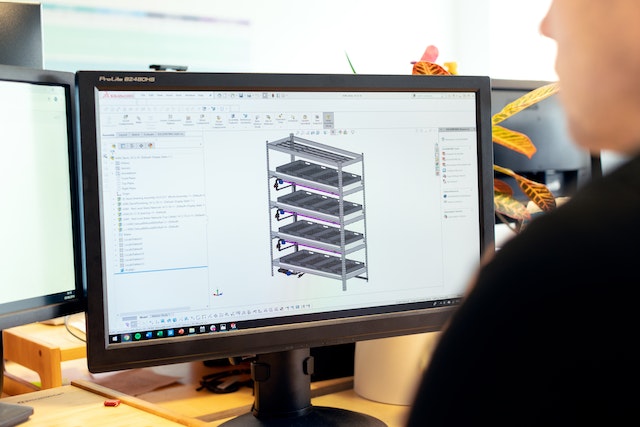There are many benefits to implementing an Enterprise Resource Planning (ERP) system for your business. ERPs provide centralized data, increase efficiency, and encourage collaboration across departments. Many businesses are hesitant to implement an ERP because it can be a long and complex process.
In this blog, we will discuss the common challenges in ERP integration and how to overcome them.
What is ERP software integration?
ERP integration is the process of connecting an ERP with other software or systems used by an organization. The goal of ERP integration is for real-time data to flow between all parts of a business to enhance efficiency.
For example, COUNTERPART ERP seamlessly integrates with SOLIDWORKS, a popular 3D CAD software. This integration eliminates the need for manual data entry. It also streamlines the transfer of design information. This reduces errors and saves valuable time for your team.
Why ERP implementation can be a Challenge
ERP integration affects all aspects of a business. Because of this, it can be a challenging process. Here are some key challenges that organizations often encounter when attempting ERP integration:
- Determining which processes should be integrated
The first hurdle most companies face is figuring out which processes and systems they should integrate. They need to be systems that can be integrated without disrupting your business flow. This is particularly complicated for organizations with competing divisions.
Without an ERP, employees spend too much time gathering data from multiple spreadsheets and sources. By integrating systems with an ERP solution, you get a single data source. This streamlines operations and boosts efficiency. - Data integrity
ERPs provide a single source of data for every part of an organization. A key part of integrating an ERP is data migration. This typically involves moving established data from older systems into the ERP. In theory, this seems easy but in practice, it could involve needing to take a deep dive into older systems and spreadsheets. This can take up a lot of time and still result in lost data. - Getting team members on board
It is a fact of life that people tend not to like change. At this point, your current system is deeply ingrained in all of your processes. Replacing that system with something new will likely result in some pushback. This resistance can result in delays in the integration process.
To combat this, make sure that your team is fully informed on the ways the ERP will make their lives easier. Make sure they are thoroughly trained and the team is comfortable before launching a full rollout. - Staying on your timeline
Integrating an ERP is a large process that is highly involved. It involved melding processes and systems from across the organization into one place. Between finding and then migrating the data and making decisions on how to map workflows to the ERP, it is easy to underestimate the time it will take to finalize the integration. - Lack of flexibility
If an ERP system isn’t flexible, your company might need to reshape its processes to make both systems cooperate. This might seem challenging and time-intensive. But, rearranging your business and retraining your team would be highly valuable.
By choosing software that matches your company’s exact requirements, you can steer clear of any rigidity tied to ERP implementation. - Continuous improvements
ERP implementation is an ongoing effort that does not end when the system launches. The solution must adapt to new business needs and technology changes. You must continue managing it post-deployment, addressing issues, and accommodating new requirements.
Once in use, ERP systems often serve for over a decade. Regular reviews are necessary to ensure the system aligns with the organization’s needs. Cloud-based systems offer easier upgrades and access to new features.
How to Overcome These Challenges
These challenges may seem daunting but, fear not, you can overcome them! You can face these challenges by focusing on:
Proper project management
Effective project management is key to overcoming ERP integration challenges. A well-structured plan with clear objectives, timelines, and resource allocation helps anticipate and address potential hurdles. Regular communication, a skilled project team, and risk mitigation strategies contribute to smoother integration.
Thorough testing, user training, and documentation ensure a successful transition. Make sure you have a post-integration support plan. Focus on a continuous improvement plan to help solidify the success of the ERP integration.
Staying flexible
Being flexible is crucial for overcoming ERP integration challenges. Flexibility lets you adjust to unexpected issues, change plans if needed, and find solutions quickly. It helps you adapt to technical problems, data complexities, and user concerns, ensuring a smoother integration process and better business outcomes.
Team training
Team training is key to conquering ERP integration challenges. When your team is well-trained, they can handle complex processes better, reducing mistakes and delays. Training helps them understand the new system. It also boosts their confidence in using it.
Good training also encourages teamwork and cooperation among departments. Ongoing training and support ensure that employees can solve problems, use the system well, and keep improving. By investing in proper team training, you can minimize integration problems, boost employee confidence, and make the most of your ERP system for better business results.
COUNTERPART can help!
COUNTERPART ERP is your ally in conquering ERP challenges. It ensures seamless integration and aligns processes strategically. It also simplifies data migration and supports smooth transitions. With agile flexibility and ongoing support, COUNTERPART empowers efficient operations and business growth.
Our team will help guide you through the implementation process. Start with a demo and see exactly what COUNTERPART can do for you!
